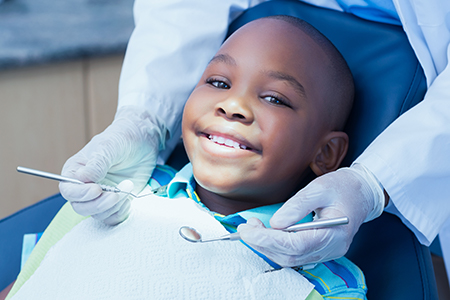We speak English, Spanish and Portuguese
We speak English, Spanish and Portuguese

At the office of Inspirational Smiles, the health, comfort, and long-term development of your child's smile are our highest priority. We focus on prevention, education, and thoughtful dental care so children can build healthy habits and enjoy confident smiles as they grow.

Good oral health starts at an early age. Establishing consistent dental checkups and a gentle routine for brushing and flossing helps protect developing teeth and sets children up for fewer problems later on. Prevention is the most effective way to preserve natural teeth and support overall well-being.
Our approach combines clear, age-appropriate instruction with clinical care that monitors growth and intercepts problems early. Each visit is an opportunity to assess development, answer questions, and reinforce healthy habits in a positive, reassuring atmosphere. Children leave feeling capable and parents leave feeling informed.
We offer a full range of pediatric services designed for different stages of childhood—infancy through adolescence—including routine exams, cleanings, preventive treatments, and guidance tailored to each child’s needs. Our team works collaboratively with families to create a customized plan that evolves as your child grows.
Regular dental exams are more than a quick look inside the mouth. During a visit we review medical history, examine teeth and gums, evaluate bite and jaw function, and screen for any signs of disease or developmental concerns. Early detection allows for simpler, more effective care.
Dental cleanings remove plaque and tartar from areas that are hard to reach at home, and professional assessments identify spots vulnerable to decay. When necessary, we use digital radiographs to see beneath the surface and verify that teeth and roots are developing normally—this information guides prudent, science-based recommendations.
We also focus on behavior guidance and comfort strategies so children feel safe and cooperative. Clear communication, distraction techniques, and a calm environment make dental visits a positive experience and reduce anxiety over time, which encourages lifelong care habits.

Tooth decay is common among children, but it is largely preventable with consistent home care and professional support. We emphasize daily brushing with an appropriate fluoride toothpaste, flossing when teeth contact, and limiting frequent exposure to sugary foods and drinks to reduce the risk of cavities.
When clinically indicated, protective measures such as dental sealants and topical fluoride applications are effective additions to at-home care. Sealants shield the grooves of molars from bacteria and food particles, while fluoride strengthens enamel and helps resist acid attack from sugars and plaque.
Parents play a vital role by modeling good habits and supervising younger children’s brushing until motor skills and attention make independent care reliable. We provide practical tips for making oral hygiene simple and engaging—small, consistent actions add up to large benefits for a child’s dental health.
Baby teeth begin forming long before they appear, and some front teeth may erupt within the first year. For this reason, establishing an early dental partnership is important. The American Dental Association and the American Academy of Pediatric Dentistry recommend children see a dental professional around their first birthday or when the first tooth appears.
Early visits focus on prevention and education: how to clean emerging teeth, avoid prolonged bottle or sippy-cup exposure to sugary liquids, and recognize signs of teething or decay. These early checkups help parents feel confident caring for tiny smiles and allow clinicians to monitor growth from the start.
Teething can be uncomfortable for infants; we offer safe, practical strategies to ease discomfort and review feeding practices that protect developing teeth. If babies are at higher risk for decay due to frequent nighttime feeding or other factors, we discuss targeted prevention to keep primary teeth intact until they are naturally shed.

School-age children experience rapid dental changes as primary teeth give way to permanent teeth. Regular monitoring lets us identify shifts in alignment, overcrowding, or bite concerns early, so families can consider timely options if orthodontic care becomes appropriate. Early observation can simplify later treatment.
Active children can be at risk for dental injuries during sports and recreation. Custom-fitted mouthguards offer better protection than stock models and reduce the chance of chipped, fractured, or displaced teeth. We advise on appropriate protective gear and can provide professionally made mouthguards when needed.
Nutrition and lifestyle also shape dental health during growth. A balanced diet rich in vitamins and minerals supports strong tooth structure and healthy gums, while reducing frequent snacking on sugary or sticky foods lowers cavity risk. We provide practical guidance for school lunches, snacks, and hydration choices that benefit both oral and overall health.
Begin dental care early and establish regular checkups.
Keep baby and toddler teeth clean with age-appropriate techniques.
Avoid letting infants fall asleep with bottles containing milk or juice.
Bring children in for routine exams and preventive visits as recommended.
Lead by example—encourage consistent brushing and flossing routines.
Choose healthy snacks and water over sugary beverages whenever possible.
Help children give up pacifiers and thumb habits at appropriate ages to protect alignment.
Use a properly fitted mouthguard when children participate in contact or high-impact sports.
As children mature, we assess facial growth, jaw relationships, and tooth position at each visit. These evaluations guide decisions about interceptive care and the timing of orthodontic consultations. Many developmental issues are easier to address when identified early, often reducing complexity later.
We also look for habits or patterns—thumb sucking, prolonged pacifier use, or mouth breathing—that can influence dental development. When intervention is helpful, we present options that are appropriate for your child’s stage and explain the expected benefits so families can make informed choices.
Children’s active lives mean dental emergencies can occur—falls, sports injuries, sudden toothache, or infection. When urgent treatment is necessary, timely assessment and care help relieve pain and minimize long-term damage. Our team is prepared to evaluate common pediatric dental injuries and respond with appropriate treatment.
Whether addressing a chipped or displaced tooth, managing soft-tissue injuries, or treating a painful infection, our priorities are comfort, safety, and restoring oral health. We explain what to expect during emergency care and offer clear instructions for follow-up at home to support recovery.
We also help families prepare for the unexpected by reviewing simple first-aid steps to protect teeth after an injury and advising when prompt professional attention is required. Clear guidance and a steady approach make emergency situations less stressful for both child and caregiver.
Summary: Pediatric dentistry at Inspirational Smiles combines education, prevention, and developmentally appropriate care so children build healthy smiles that last. From infancy through the teen years, our team emphasizes early detection, sensible prevention strategies, and confident, compassionate treatment. Contact us to learn more about how we can support your child’s oral health and development.

A pedodontist is a dentist who has received advanced specialty training in meeting the dental needs of children from infancy to adolescence. Pedodontists, also referred to as "pediatric dentists," study child psychology, behavior management, caring for children with special needs, methods of handling oral/facial trauma, and various techniques for providing anesthesia and sedation. Pedodontists also understand the complexities of facial growth and development and have the clinical skills required to meet the dental needs of all children at every stage of development. Most of all, pedodontists are passionate about what they do and enjoy working with children. They strive to make every dental experience a positive one as they help children establish a strong foundation for good oral health.
Even before your child is born, their first set of teeth is already forming. In fact, by one year of age, some of your baby's front teeth will have already come into place. While the arrival of your baby's first teeth is only one of many developmental milestones, it represents an excellent time to begin a program of oral care. According to recommendations from the American Dental Association, babies should see the dentist around the time of their first birthdays.
Your baby's first teeth typically begin to appear in the 6 to 12-month range. While this is an extraordinary milestone, you need to be aware that your baby may find the experience a little bit uncomfortable. Teething can make babies feel irritable. They may be fussy, have trouble sleeping, not want to eat, and drool quite a bit.
Although you are powerless to speed up the process of teething, there are a few things that you can do to soothe your baby as the new teeth are erupting into place. Common approaches to helping your baby feel more comfortable while getting new teeth, include teething rings or a cold spoon or moist gauze rubbed over their gums.
Even for these few new teeth, it's absolutely essential to establish an effective regimen of oral care. For information on when your baby's first set of teeth will erupt into place, consult this timeline from the American Dental Association: Eruption Charts
Some children persist in sucking their thumbs or fingers beyond their preschool years. For these children, the activity continues to be a source of comfort, relaxation, and security. It may even help them fall asleep at night. However, it's essential to be aware that in the long-term, a finger sucking habit is not healthy.
If your child's thumb or finger sucking habit is still present when the permanent teeth begin to come in, your child is at a higher risk of developing a bad bite. By the age of five or six years, you need to constructively and gently help your child stop the habit.
It's also a good idea to have a comprehensive evaluation at this time. Your pedodontist can assess if there are any habit related alterations to the alignment of your child's teeth or jaws, or if it is affecting their speech or swallowing patterns. They can also discuss habit control strategies with you, as well as follow your child's bite and facial development as they grow. If interceptive appliances or corrective orthodontic care are recommended, the timetable and best options in care will be explained in complete detail.

Looking to schedule your next dental visit or learn more about our services?
Getting in touch with Inspirational Smiles is simple! Our caring team is ready to help with appointment scheduling, questions about treatments, or any concerns you may have. You can call us or use our easy online contact form—whatever works best for you.
Take the first step toward a healthier, more confident smile today and experience the difference that personalized, compassionate dental care can make.